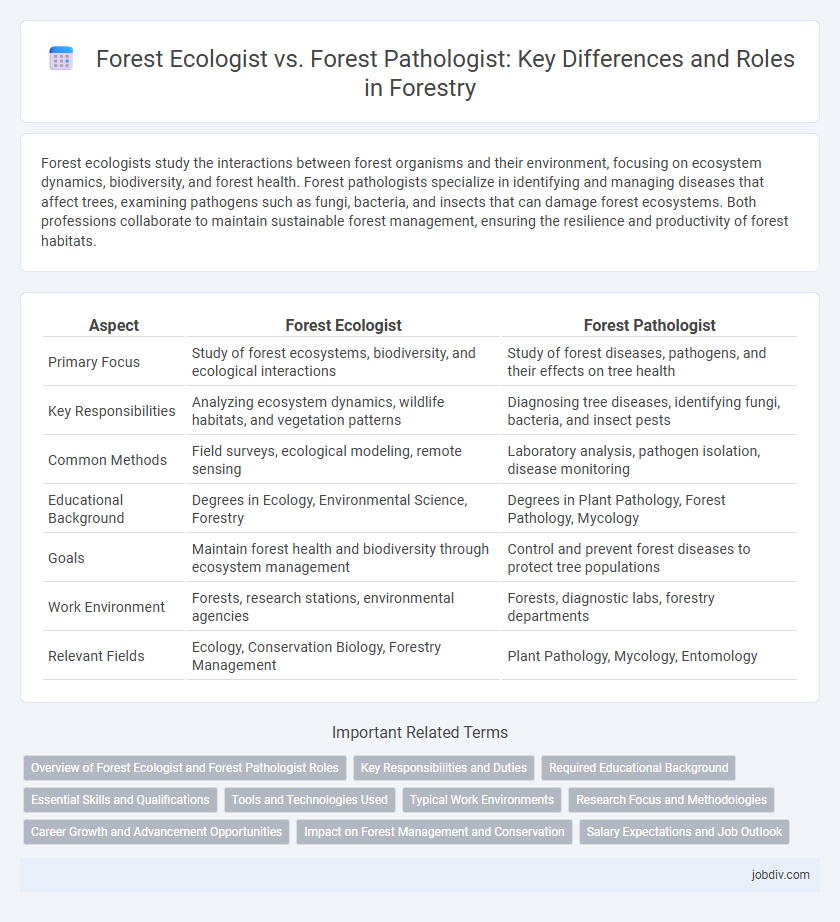Forest ecologists study the interactions between forest organisms and their environment, focusing on ecosystem dynamics, biodiversity, and forest health. Forest pathologists specialize in identifying and managing diseases that affect trees, examining pathogens such as fungi, bacteria, and insects that can damage forest ecosystems. Both professions collaborate to maintain sustainable forest management, ensuring the resilience and productivity of forest habitats.
Table of Comparison
| Aspect | Forest Ecologist | Forest Pathologist |
|---|---|---|
| Primary Focus | Study of forest ecosystems, biodiversity, and ecological interactions | Study of forest diseases, pathogens, and their effects on tree health |
| Key Responsibilities | Analyzing ecosystem dynamics, wildlife habitats, and vegetation patterns | Diagnosing tree diseases, identifying fungi, bacteria, and insect pests |
| Common Methods | Field surveys, ecological modeling, remote sensing | Laboratory analysis, pathogen isolation, disease monitoring |
| Educational Background | Degrees in Ecology, Environmental Science, Forestry | Degrees in Plant Pathology, Forest Pathology, Mycology |
| Goals | Maintain forest health and biodiversity through ecosystem management | Control and prevent forest diseases to protect tree populations |
| Work Environment | Forests, research stations, environmental agencies | Forests, diagnostic labs, forestry departments |
| Relevant Fields | Ecology, Conservation Biology, Forestry Management | Plant Pathology, Mycology, Entomology |
Overview of Forest Ecologist and Forest Pathologist Roles
Forest ecologists study the interactions between forest organisms and their environment, focusing on ecosystem dynamics, biodiversity, and conservation strategies to maintain forest health. Forest pathologists specialize in diagnosing and managing diseases caused by pathogens, such as fungi, bacteria, and viruses, that threaten tree health and forest productivity. Both roles are critical for sustaining forest ecosystems, with ecologists emphasizing ecological balance and pathologists targeting disease control.
Key Responsibilities and Duties
Forest ecologists study the interactions between trees, plants, animals, and their environment to understand ecosystem dynamics and promote sustainable forest management. Forest pathologists specialize in diagnosing, monitoring, and controlling diseases and pests affecting forest health to prevent widespread damage. Both roles collaborate to maintain forest ecosystems, with ecologists focusing on ecosystem balance and pathologists targeting disease prevention and mitigation.
Required Educational Background
Forest ecologists typically require a bachelor's degree in ecology, environmental science, or forestry, often followed by a master's or doctorate specializing in forest ecosystems and biodiversity. Forest pathologists need a strong foundation in plant pathology or forest health, usually acquiring a bachelor's degree in forestry, plant sciences, or biology, with advanced studies focusing on tree diseases and pathogen management. Both professions benefit from fieldwork experience and research skills, but forest pathologists emphasize coursework in microbiology, pathology, and disease diagnosis.
Essential Skills and Qualifications
Forest ecologists require strong analytical skills and expertise in ecosystem dynamics, biodiversity, and environmental science, often holding degrees in ecology or environmental biology. Forest pathologists specialize in diagnosing and managing tree diseases, necessitating proficiency in plant pathology, microbiology, and laboratory techniques, typically backed by degrees in plant pathology or forestry. Both professions demand fieldwork experience, data analysis capabilities, and knowledge of forest management practices to maintain healthy forest ecosystems.
Tools and Technologies Used
Forest ecologists utilize Geographic Information Systems (GIS) and remote sensing technologies to analyze forest composition, biodiversity, and ecological processes over large landscapes. Forest pathologists employ molecular diagnostic tools, such as polymerase chain reaction (PCR) and microscopy, to identify and study pathogens affecting tree health. Both specialists integrate drones for aerial surveys, enabling real-time monitoring of forest conditions and early detection of disturbances.
Typical Work Environments
Forest ecologists typically work in diverse outdoor settings such as national parks, wildlife reserves, and research forests to study ecosystem interactions and biodiversity. Forest pathologists are often found in laboratories, arboretums, and managed forest plantations where they analyze tree diseases and develop management strategies. Both professions collaborate in academic institutions and governmental agencies dedicated to forest health and conservation.
Research Focus and Methodologies
Forest ecologists study the interactions between forest organisms and their environment, emphasizing ecosystem processes, biodiversity, and habitat dynamics using field surveys, remote sensing, and modeling techniques. Forest pathologists specialize in diagnosing and managing diseases affecting trees, utilizing laboratory analysis, pathogen identification, and disease progression monitoring. Research methodologies in forest ecology often involve large-scale ecosystem assessments, while forest pathology relies on microscopic examination and inoculation experiments to understand disease mechanisms.
Career Growth and Advancement Opportunities
Forest ecologists experience career growth by specializing in ecosystem management, biodiversity conservation, and climate impact assessment, with advancement opportunities in research institutions, government agencies, and environmental consultancy firms. Forest pathologists focus on diagnosing and managing tree diseases, gaining expertise that leads to roles in forest health monitoring, pest control, and policy development for sustainable forestry practices. Both professions offer upward mobility through advanced degrees, certifications, and leadership roles in forest management and environmental protection sectors.
Impact on Forest Management and Conservation
Forest ecologists analyze ecosystem interactions and biodiversity patterns to guide sustainable forest management and promote habitat conservation, while forest pathologists specialize in identifying and controlling diseases that threaten tree health and forest productivity. Integrating ecological insights with disease management strategies enhances forest resilience and supports long-term conservation goals. Effective forest management depends on collaboration between ecologists and pathologists to balance ecosystem stability with disease mitigation.
Salary Expectations and Job Outlook
Forest ecologists typically earn between $55,000 and $80,000 annually, with job growth projected at about 5% over the next decade due to increased emphasis on ecosystem management and climate change research. Forest pathologists have a slightly narrower salary range, averaging $60,000 to $75,000, driven by demand for disease management in commercial forests and rising concerns over invasive species. Both careers offer steady employment prospects, but forest ecologists may find more opportunities in environmental consulting and policy development, while forest pathologists are often sought by government agencies and forestry companies focused on tree health and disease prevention.
Forest Ecologist vs Forest Pathologist Infographic

 jobdiv.com
jobdiv.com